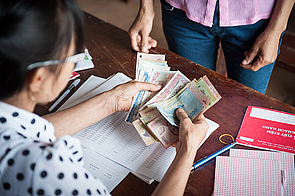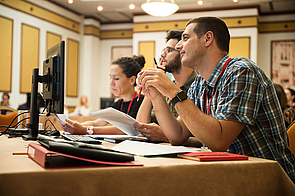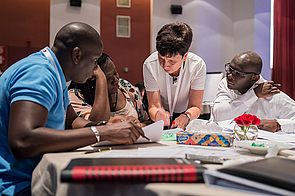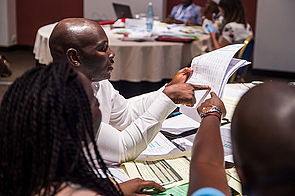Business Games Impressions
A success model blazes a trail around the world
Since their beginnings in the 1990s, the Business Games made by Sparkassenstiftung have become an international brand for an innovative and interactive learning experience. Learning with haptic and computer-based simulations is knowledge far away from dry theory. Vast demand and experience in many countries around the world as well as highly satisfied participants are convincing proof of the success of the Business Games.
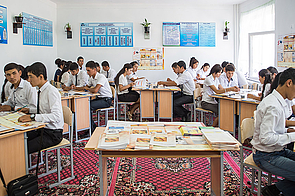
Since the 1990s, Sparkassenstiftung offers its Business Games to various target groups in its project countries. In many places, the Business Games have meanwhile become an integral part of school education. More and more teachers undergo special trainings to impart financial literacy to their pupils.
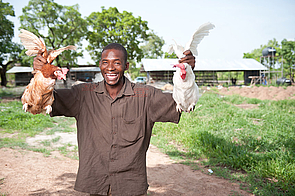
The Ghanaian Kwame Asamoah owns a chicken farm. Self-employed micro and small-scale entrepreneurs like him particularly profit from Sparkassenstiftung’s Micro Business Game and Farmers Business Game. In these business simulation trainings, the participants learn in a playful way how to improve the success and sustainability of their enterprise.
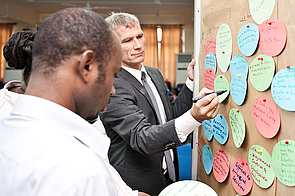
The main targets of the Business Games are to teach people to identify problem causes and to analyse correlations. By interpreting the results and evaluating player performance, the teams shape and hone their own success strategy.

What is a loan? Why is it so important to save and how do I generate savings? Why should I save with a bank instead of keeping my money at home under the mattress? These and other questions cannot be answered early enough. That is why Sparkassenstiftung uses its Business Games to improve the financial education of children and youth.

In addition to breeding birds and fish, Manola Joy also owns a store in Laos, where she sales various homegrown foods and a small collection of household supply. Particularly, women in developing countries and emerging economies have difficulties in getting access to financial services. With the help of Sparkassenstiftung’s business simulation trainings, micro and small-scale entrepreneurs like Manola Joy learn how to safeguard their income and sustainably develop their enterprise by taking smart business decisions.
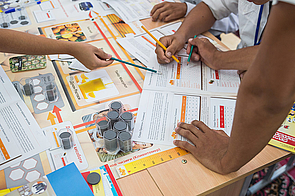
Being one of Sparkassenstiftung’s board-based Business Games, the Micro Business Game teaches about economic interrelations and imparts entrepreneurial skills. With the help of a playboard, the business processes of an orange juice store are illustrated. The players take on the role of a microentrepreneur and pursue the goal of leading their business to success. In so doing, they learn which decisions, ways of thinking and behaving can lead to entrepreneurial success or failure.
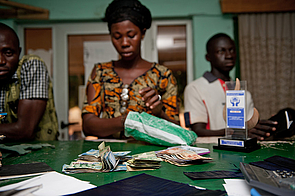
Every evening, this owner of a small Ghanaian boutique deposits her daily cash receipts with the Credit Union she trusts. Confiding in the house bank is an important issue. This trust is based on an offer of adequate financial services, but even more so on well-trained bank staff. That is why in Ghana, Sparkassenstiftung’s Business Games are particularly used to professionalise the bank staff of credit cooperatives and microfinance associations.

You can imagine, how and where these Vietnamese women keep their money. In many development countries and emerging economies there is no access to financial services. But even more so, the people do not trust the financial system and lack the knowledge about how to use financial products correctly, like, for instance, a savings account. With the help of selected training measures for bank staff, on the one hand, and for small-scale entrepreneurs, private households, children and youth, on the other, Sparkassenstsiftung’s Business Games help to change this situation.
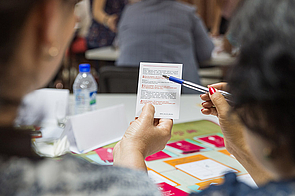
The participants of the Business Game trainings always act in teams. Thus, personal knowledge and skills can be directly applied and at the same time be broadened by exchanging with other team members. Discussing different issues in groups and competing with participating teams plays a decisive role in the didactic conception of the Business Games.
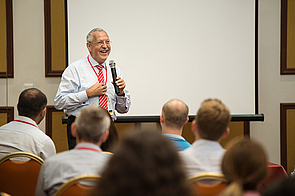
For decades, Ferdinand Feldgen has worked as project manager and deputy managing director at Sparkassenstiftung’s head office. Sparkassenstiftung’s Business Games have been his special field of expertise from day one on. Instead of now enjoying lazy days in retirement, he decided to continue working as faithful coach and trainer for Sparkassenstiftung’s Business Games and imparting his expertise all around the globe.

Robert de Beauplan from Algeria forges hand-made household supplies and jewellery from copper and bronze. He has learned his profession from his father, who learned it from his father. Robert de Beauplan hopes that he can pass his business on to his son in the near future. For small-scale entrepreneurs like him the Business Game trainings are important to keep his smithy on a successful track.
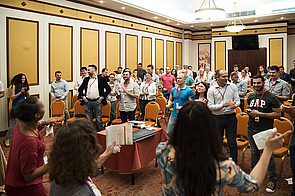
Sparkassenstiftung’s portfolio of Business Games comprises simulations for small-scale entrepreneurs, children, youth, pupils, students and private households, but also for bank managers and bank staff, as this picture shows. In particular, the practical approach pursued by the Business Game trainings, the interaction with other people and the opportunity to try things out in a real-life scenario enthuses the participants worldwide.

Like in Algeria, many people worldwide are living in difficult conditions. The economy is stagnating, cities and villages are dying. Financial inclusion is a key to a better future. Sparkassenstiftung supports this goal with its Business Games and helps people all around the globe to improve their chances in live.
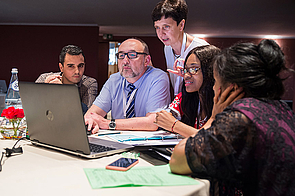
More than anything, the participants of the business simulation trainings appreciate the risk-free environment in which they can try things out and the evaluation and analysis of their team results through experienced trainers. Thus, they learn in a playful mode to develop successful strategies and apply them in a real-life scenario.
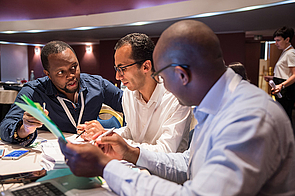
Although the Business Games impart financial education in a playful mode, the training sessions are highly demanding. In particular, the business simulations offered to banking experts are full of difficult questions and problems. In handling these difficult tasks, the participants learn how to think in a solution-focused way and master the daily challenges of bank management.

During the Business Game trainings, the participants build teams who play against each other. The competition and the motivation to finish the game as the winner is one of the core parts of the underlying didactical conception. Everyone loves to be the winner, be it in solving tricky tasks or during rather refreshing team exercises in breaks between the different session rounds, as can be seen here in the picture.
Photographer: Philip Ruopp, (c) Sparkassenstiftung

